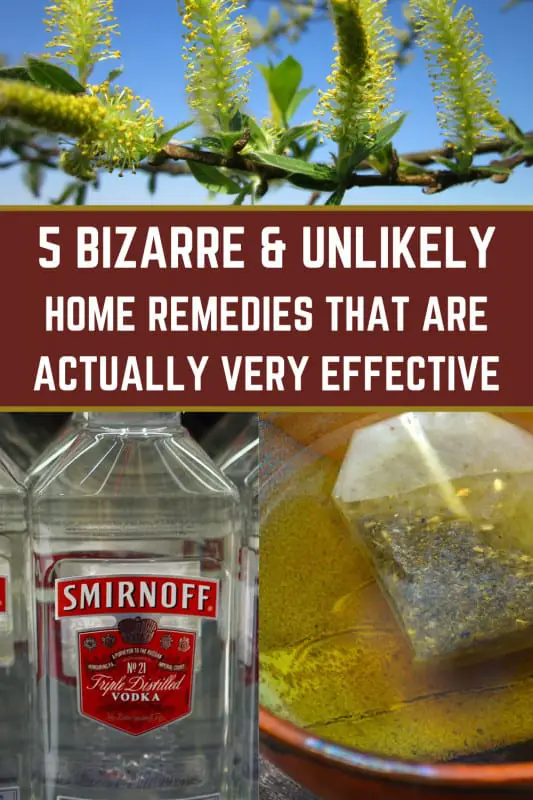We’ve all been exposed to home remedies of one kind or another. Although entertaining, such as the one claiming to cure acne with urine, most are not worth even trying. However, this isn’t the case with all home remedies. The following list consists of home remedies backed by science – not your great grandmother’s aunt from the Old Country.
Kill Foot Odour With a Vodka Foot Wash
Foot odour can arise from many sources. Whether you sweat more than the average person or a certain type of shoe material seems to bring out the funk in your feet, vodka has long been used as a natural way to deodorize feet.
Preliminary research suggests vodka eliminates foot odour due to its antiseptic properties. Foot odour comes from bacteria who live off your sweat. The sweatier your feet, the greater the bacteria, which means the stinkier your feet. Simply pour enough vodka into a basin to fully submerge your feet. Add 1 cup of water and soak each foot for 5 to 10 minutes. Repeat every morning or night to prevent your feet from clearing a room the moment your shoes come off.
Eliminate Headaches the Natural Way
While you’ve probably never heard of Willow Bark, this plant species has been used since Hippocrates as a pain reliever and anti-inflammatory agent. In fact, this plant is so successful at treating headaches and other ailments that it was used as a primary element to develop aspirin. The primary active compound, known as salicin, is noted by researchers to provide near-instant headache relief.
If you feel the nagging pressure or thumping, make a Willow Bark tea by placing 2 teaspoons of dried bark into 8 ounces of water. Allow the tea to lightly boil for 10 to 15 minutes, then steep for 30 minutes. For faster relief, take 60 to 240 milligrams of a salicin nutritional supplement. Don’t have access to either of the aforementioned? Almonds feature the same active compound. Eat 20 almonds at the beginning of any headache. In fact, research suggests those who eat 10 to 15 almonds per day have fewer headaches than those who don’t.
Clove Oil for Toothaches
Have you ever smoked a clove cigar? If so, you probably notice your mouth and tongue were instantly numb. This herb is known for its ability to numb the skin. In fact, clove oil is commonly used in modern dentistry as a pain control treatment throughout a procedure. It’s believed the effectiveness of clove oil for toothaches is due to a compound known as Eugenol. This compound is so effective, many dentists recommend it for emergency toothache relief.
To experience relief, place 1 to 2 drops of clove oil directly on the affected portions of your mouth. Try not to swallow the oil. Repeat until you can find permanent toothache relief by visiting your dentist.
Beat Herpes With Green Tea
The herpes virus is one of the most successful viruses known to man, as nearly 40 per cent of the worldwide population his infected. Herpes treatment is often a combination of synthetic oral medications and topical ointments; however, one of the most effective home remedies for genital herpes is green tea. When consumed and applied topically, its primary compound, Epigallocatechin Gallate, actually stops the herpes virus from replicating while simultaneously reducing outbreak severity and duration. In fact, a study published in the March 2008 edition of ‘Antimicrobial Agents and Chemotherapy’ found green tea not only reduced outbreak duration but also the risk of transmission.
Consume 2 to 4 cups of freshly brewed green tea per day, and attack an outbreak by combining 5 to 10 drops of pure green tea extract with 2 teaspoons of coconut oil. Apply directly onto the herpes lesion until it disappears.
Relieve Eczema Itch and Pain With Evening Primrose Oil
While the severity of eczema can dramatically vary, the desire to relieve its pain, itching and swelling is universally strong. Evening Primrose Oil, or EPO, has long been used to retain skin moisture and treat various ailments; however, it’s not until recently the scientific community. The Europe PubMed Central database highlights a study published in the 1988 edition of ‘Drugs Under Experimental and Clinical Research,’ which found topical application of evening primrose oil significantly improved eczema symptoms and severity. It’s believed this oil provides such relief through a compound known as Efamol, which contains forms of linoleic acid.
With your physicians’ consent, apply 3 to 4 drops of EPO directly to affected portions of your skin. Repeat one to two times per day for relief.





